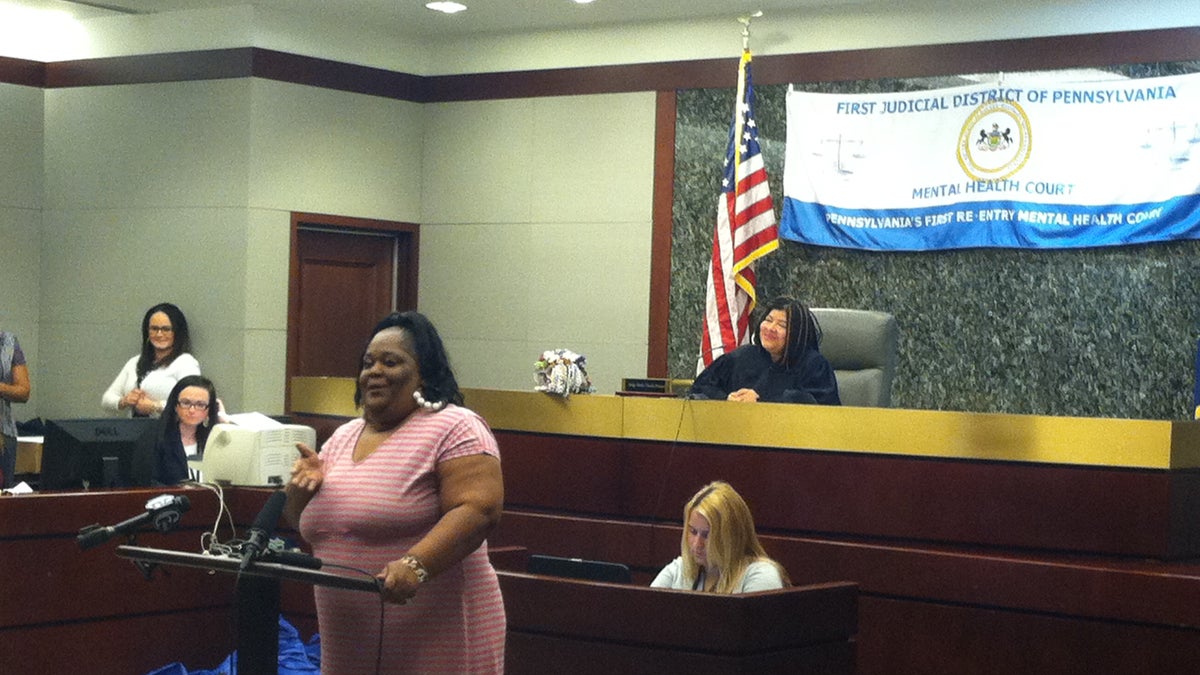Philly mental health court celebrates five years of putting offenders in treatment, not jail
Listen
Participant Geraldine Horne says the mental health court helped her live independently, after spending time in a halfway house. (Laura Benshoff/WHYY)
The first mental health court in Pennsylvania celebrated five years of getting offenders — who would otherwise be in jail — into mental health treatment Thursday.
These courts provide alternatives to incarceration for nonviolent offenders with acute “clinical disorders,” as defined by the Diagnostic and Statistical Manual.
Lois Ransome was one of the 28 participants saluted for her hard work.
“When I first met Lois, she was in a hospital, she was in a coma, she was clinically dead,” said Philadelphia Police Detective Timothy Quinn. “In the past two years, she’s beaten death, she’s beaten brain trauma, and she’s beaten her 15-year addiction. Here’s to the strongest woman I know.”
Some participants received more than accolades –- the court awarded a few participants early termination of their probation.
“I was like ‘Oh, my God,'” said Angelo Zayas, who did not know it was his last day of probation. “I was hoping for the best and just doing what I gotta do.”
Even though he will no longer be required to appear in court, he said he will continue to access treatment services he started while on probation.
“The services are still available to me and that’s what I like about the program,” Zayas said. “They’re very thorough.”
Judge Sheila Woods-Skipper presides over the court, which funnels eligible offenders into one of six possible tracks – depending on the severity of their mental illness and other special conditions.
This year the court introduced a new track for people found “not competent” to stand trial, said Flo Messier who works in the mental health unit of the Defender Association of Philadelphia. “There are two factors to being legally competent — you have to know the charges against you, the process.”
The second component is the ability to work with an attorney, something she says can be challenging for these “forgotten among the forgotten.”
Traumatic brain injury, stroke or medication complications can all recommend an offender for an alternative to jail time based on their competency.
Representatives from Project HOME, the Defenders Association of Philadelphia, and the district attorney’s office came to praise the merits of this “problem-solving” court.
“Diversion courts reduce crime, make neighborhoods safer, save taxpayers money, and, most of all, help the participants return to their communities as productive citizens,” said Superior Court Judge James Fitzgerald. “It’s a win-win situation.”
But the benefits aren’t that cut and dry, according to researchers from the National Centers for State Courts.
“We say if you’ve seen one mental health court, you’ve seen one mental health court,” said Deborah Smith, senior analyst at NCSC.
Each state, even each court, develops its own rules and criteria for treatment, she said. And that makes research into their effectiveness difficult, as does the difficulty in finding an accurate comparison group.
Drug courts, another type of “problem-solving” court, have been studied extensively. Smith said supporters like Fitzgerald may be extrapolating the successes of those courts to mental health courts. To date, Smith said, there has been no cost analysis of mental health courts.
There’s more work to do to make sure people in jail can get treatment, said Woods-Skipper. “We need the ability to assess them properly behind the walls,” she said.
It’s hard to initiate care while people are incarcerated because, she said, “their insurance is all turned off and that impedes the possibility to get them in a facility.” She would like to see a transitional facility for offenders with mental illness — somewhere they could be assessed for 60-90 days to make sure they receive an accurate mental health diagnosis.
The court has supervised the cases of 205 people with mental illness since 2009, and Woods-Skipper sees between 100 and 125 people during court hours every Thursday. Over 20 percent of inmates in Pennsylvania have a diagnosis of mental illness or intellectual disability.
Sixteen Pennsylvania counties now have mental health courts.
WHYY is your source for fact-based, in-depth journalism and information. As a nonprofit organization, we rely on financial support from readers like you. Please give today.

